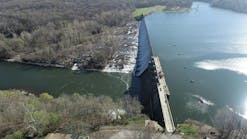Water companies wading into Middle Eastern and African water and wastewater treatment equipment industry urged to leverage local market expertise
March 18, 2003 -- Rapid population growth across the Middle East and Africa is certain to intensify pressure on water resources. These water-stressed conditions are exacerbated by the increasing scarcity of natural water supplies and the high urbanization rate, leading to very low per capita freshwater accessibility.
The region as a whole is approaching serious water shortages and contamination of groundwater, prompting numerous European and US companies to find their feet in this growth region, away from the mature Western European and US markets for water and wastewater treatment equipment.
Fast growing tourism destinations in the Middle East and Africa, as well as the industrial expansion witnessed in the Gulf region, first and foremost Jeddah's flourishing high-tech manufacturing industry, create a growing demand for high-quality potable water.
According to latest findings by Frost & Sullivan, the international market consultancy, a number of large, multi-disciplinary construction companies are active in the EUR 2.0 billion Middle Eastern and African water and wastewater treatment equipment market.
Most of the major players already operating in or exploring the area predominantly are Western Europe. For example, bidders tend to be of French and German origin, such as Ondeo and Vivendi, VA Tech Wabag, amongst others. US companies such as Ionics are present as are locally based companies such as Metito.
To cement their foothold in the region, the dominant players have acknowledged the importance of understanding the local culture and market needs, as well as the ability to respond effectively, by forging closer ties and creating alliances with local construction companies and consultancies.
At the same time, these companies have developed their own tailor-made technologies to meet specific regional needs. Local knowledge therefore forms an invaluable asset in the pursuit of market dominance.
A company looking to break into the market may consequently find it very difficult to penetrate this market where other companies have already established their presence, especially in the Middle East.
Frost & Sullivan remarks on the growing number of local companies appearing in the market, largely supplying less technologically advanced equipment. Still, especially for cash-strapped municipal end-users, requirements tend to revolve around basic, however, affordable products.
The study adds that different countries present very disparate levels of market diversification and fragmentation, so new entrants should be aware of political, economical and social factors determining how these services are financed and regulated.
Market trends, and particularly changing end-user behavior, are changing the landscape of the Middle Eastern and African market for water and wastewater treatment equipment. Professional service and ongoing support, an integrated approach and tailored solutions to match their treatment needs, now count amongst the key issues from a customers' perspective.
This further necessitates the supplier's actual and physical presence in the local markets, which can be achieved by establishing local sales offices.
"Whether these will be chosen to operate as subsidiary companies, as representatives or distribution agents, depends on the intended degree of commitment, the time horizon and the willingness of the suppliers to take market risks. Nevertheless, current market conditions signify the end of "short-termism" and impose a long-term perspective," comments Matthew Barker, Industry Analyst at Frost & Sullivan.
Future years will continue to see sustained growth in both the water, and increasingly, the wastewater sectors. Frost & Sullivan expects the market to grow at a compound annual growth rate of around 4.8 per cent between 2002 and 2020, with total revenues climbing to EUR 4.7 billion in 2020.
The market will still grow in spite of challenging economic conditions, however, margins will be squeezed and suppliers must implement innovative strategies to maintain or grow their profitability.
The Middle East and North Africa account for the lion's share of total revenues and this trend is set to continue over the forecast period. economic stability being key.
Although political factors are extremely important, these regions are considered to be somewhat more attractive to, for instance, Western companies. With the experience of Western oil companies in many ways setting a precedent in the Middle East, this region holds great appeal, as does North Africa, the continent's most affluent part.
Central and Southern Africa are traditionally viewed in a different light and perceived as a low-priority market, with economic, social and political factors all deterring potential investors.
However, during the latter half of this decade, their influence and market share is expected to grow as an increasing emphasis is put on the delivery of potable water and the safe discharge of polluted wastewaters back into the environment.
Over two thirds of the market is currently made up of water treatment equipment as the principal concern at present is for the provision of water for industry, agriculture and first and foremost the population.
Environmental awareness is providing momentum behind growth in wastewater treatment equipment sales which by the end of the forecast period in 2020 with account for over 40 percent of the revenues generated in all regions, predominantly the Middle East and North Africa.
Price: EUR 6,000
Publication Date: March 2003
Report Code: B019
Frost & Sullivan is an international marketing consulting company that monitors a comprehensive spectrum of high-tech markets for trends, market measurements and strategies. This ongoing research is utilized to complement a series of research publications to support industry participants with customized consulting needs. Interviews and free executive summaries are available to the press.
For more information contact:
Kristina Menzefricke, Public Relations Department
Tel. +44 (0) 20 7343 8376
Fax. +44 (0) 20 7343 8380
[email protected]
http://frost.com


